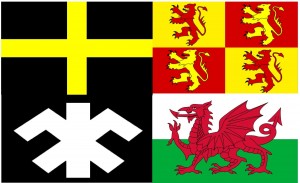Federalism vs Independence – finding the right balance
The National Liberal Party believes in a Federal Britain i.e. one that devolves power down to the four nations of the British Isles. We would also like to see in turn those nations devolving power further still to their local communities on the basis of subsidiarity i.e. ‘matters ought to be handled by the smallest, lowest or least centralized competent authority’.
The following is a guest article written by George Walton on the recent referendum supporting greater devolved power to the Welsh Assembly. The National Liberal party has printed it with the intention of initiating a debate on the subject of decentralisation and federalism.
The Extended Family – by George Walton
IN EARLY March, the people of Wales went to the polls to vote in a referendum. The resulting ‘yes’ vote suggests two possible trends that can be welcomed by all progressive nationalists.

Different symbols of Welsh nationhood. The Flag of St. David (Top Left), The Flag of Owain Glyndŵr (Top Right), a runic version of Yr Eryr Wen - the White Eagle of Snowdonia flag (Bottom Left) and the Flag of Wales Y Ddraig Goch – The Red Dragon (Bottom Right)
You may or may not know that the Welsh were asked if they wanted further devolution of powers to the Welsh National Assembly (which has functioned since 1999). Hitherto the Assembly could only pass laws for Wales if they had been approved by the UK parliament in London.
The Welsh people were asked if they wanted the Assembly to be given the power to pass laws directly (without first seeking approval from London) over things like agriculture, education, health, housing, local government, fishing, forestry, culture, the Welsh language, water supply and social welfare – run of the mill stuff like that! …. The Welsh said ‘yes’.
The turnout was 35% (not that low a figure for this sort of thing). 517, 000 (63%) said ‘yes’, and a not insignificant 297, 000 (36%) said ‘no’. This is not an astounding endorsement of devolved power, but then the Welsh only narrowly voted for having their own Assembly in the first place back in 1997.
What this shows is that minorities – pioneers – make history. They take the lead and the masses follow. Relatively small numbers of people have changed the course of history by taking the lead – this is the human condition – and the masses (usually) follow. The great mass of people do not constitute the ‘engine of history’ as the Marxists would have us believe.
The ‘yes’ vote was strongest in the rural North West and West – areas where the Welsh language and therefore Welsh national identity, is strongest – and also in the valleys to the south where there has always been a healthy tradition of rebelliousness. The only region to return a narrow ‘no’ vote was Monmouthshire, an area where Welsh speakers do not top 12% and where English heritage and blood (one would have thought) must have played their part.
So what were those two trends of interest, mentioned earlier, of interest to progressive nationalists?
Firstly the ‘yes’ vote represents some form of appetite for political devolution, not much of a one, granted -the Welsh still cannot raise their own taxes – and it is nowhere near the scale of decentralisation envisaged by me: devolved power down to the village, parish or district level… But it is a start. It’s important to be pragmatic in this day and age! The ‘yes’ vote also shows that the Welsh as an ancient nation are still hearty of spirit and consciousness. This is something to be applauded in this most cosmopolitan of epochs.
Secondly this referendum indicates that although the Welsh are very much a proud and unique people, the vote suggests that many still regard themselves (rightly) as part of a wider, extended family of British nations: i.e. the English, Scots, Welsh, Ulster-Scots, Irish, Cornish and Manx – peoples intertwined through hundreds of years of close cultural and blood ties. Although this truth may irritate the more resolute of Welsh nationalists, currently only 15% of the Welsh want full independence – could this be due to the close bonds of the British family of nations? A wider collective Britishness?
Speaking for myself, I would dearly love to see free and independent Welsh, English and Scottish nations alongside an independent Ulster and yes, Cornwall and Mann should their peoples want it. But this has to be within a framework of mutual respect and recognition of a shared, meta-tribal kinship throughout our Islands.
One task for UK based progressive nationalists is to encourage this fashion for bourgeois political devolution as a springboard for the maximum tribal and localised autonomy which is at the heart of our programme.
Date: July 23, 2011
Categories: Articles































